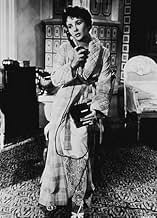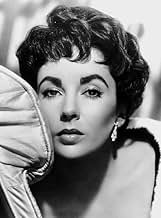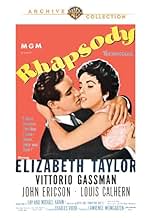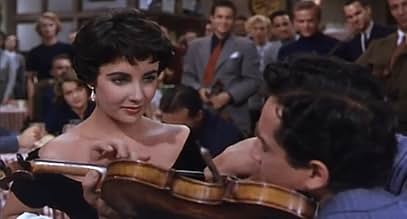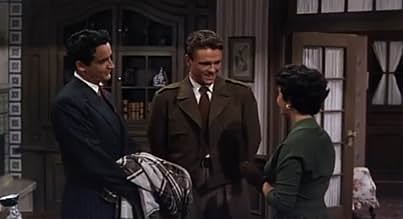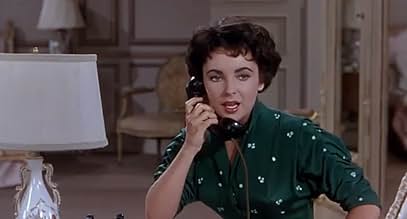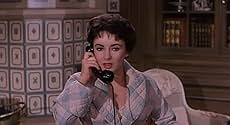IMDb-BEWERTUNG
6,1/10
1271
IHRE BEWERTUNG
Füge eine Handlung in deiner Sprache hinzuRich beauty Louise Durant follows her violinist lover to conservatory in Zurich. A pianist there falls for her. Violinist prioritizes music over Louise, pianist loves Louise more. She must c... Alles lesenRich beauty Louise Durant follows her violinist lover to conservatory in Zurich. A pianist there falls for her. Violinist prioritizes music over Louise, pianist loves Louise more. She must choose between the two men.Rich beauty Louise Durant follows her violinist lover to conservatory in Zurich. A pianist there falls for her. Violinist prioritizes music over Louise, pianist loves Louise more. She must choose between the two men.
Frank Arnold
- News Vendor
- (Nicht genannt)
Max Barwyn
- Patron
- (Nicht genannt)
George Calliga
- Passerby on Street
- (Nicht genannt)
Empfohlene Bewertungen
Yes, Rapshody is somewhat tedious and quite melodramatic, but let me mention the positive offsets:
1. The dazzlingly beautiful, voluptuous Elizabeth Taylor.
2. Adult themes, and must have been considered quite risqué at the time.
3. Emotionally charged classical music.
4. Generally quite well acted.
5. Good direction, cinematography, settings, and costumes.
Whether or not the positive offsets overcome the somewhat tedious, melodramatic plot depends on one's tolerance for melodrama and how strongly one values the various offsets.
1. The dazzlingly beautiful, voluptuous Elizabeth Taylor.
2. Adult themes, and must have been considered quite risqué at the time.
3. Emotionally charged classical music.
4. Generally quite well acted.
5. Good direction, cinematography, settings, and costumes.
Whether or not the positive offsets overcome the somewhat tedious, melodramatic plot depends on one's tolerance for melodrama and how strongly one values the various offsets.
"Rhapsody" is not the bad movie some of the comments to IMDb seem to indicate. While this was a film typical of the time when it was made, it offers some of the most glorious music ever heard in a Hollywood picture. The music takes center stage in the movie. As interpreted by Michael Rabin and Claudio Arrau, among others, Tchaikowsky, Liszt and Rachmaninoff were never given such loving tribute as in this film.
Charles Vidor directed this adaptation of a novel that might have been well regarded, enough to be brought to the screen. Ruth and August Goetz are given credit for the screen play. The Goetzes wrote many plays, among them, "The Heiress". Fay and Michael Kanin also contributed to the adaptation.
The story of Louise "Lulu" Durant, a spoiled rich girl, that defied her father into following what she thought was the love of her life, turns out to be a nightmare. Lulu was not prepared to play second fiddle, no pun intended, to anyone, let alone Paul Bronte, the talented, but egotistical violinist that is only in love with his career.
The story, by the way, takes place in Zurich, and not Munich, as someone reported in another comment. Lulu, who has ambitions of becoming a pianist, promptly realizes she is a lousy player and heeds the advice of the wise professor Schuman, but she makes the mistake of staying around, getting bored because Paul has only time for his music and not for her.
Enter James Guest, an American pianist. He falls in love with the beautiful Lulu, only to be rejected. When Paul becomes the toast of the music world, he breaks from Lulu, who in turn marries James on the rebound. Ultimately, Lulu realizes that James is the one that is real and the only one that cares for her and there's a happy ending when he makes a stunning debut playing Rachmaninoff's Second Piano Concerto.
Elizabeth Taylor, in all her beauty, is seen as the ravishing creature she was in those years. She made an impression as the spoiled "papa's girl" that she was. In this film, as well as all those Ms. Taylor made during those years, she projects such a loving presence that is hard to find fault with her acting. This actress showed such magnetism and charisma in her films, something perhaps no one else can match.
Vittorio Gassman was perhaps Italy's best modern actor. He was trying to break into American movies. As Paul Bronte, he makes quite an impression. He was dashing and had the presence and good looks to play opposite his gorgeous costar.
John Ericson shows he had potential to go far in the business. Unfortunately he never made it big in Hollywood. He was an accomplished actor who deserved better. Louis Calhern as Nicholas Durant, Lulu's father had only a few scenes in the movie, so it is puzzling for one to agree with another comment about how he carried the film on his shoulders. If it was, it remains a mystery to us. Mr. Calhern was a fine actor who show a natural elegance to every thing he did in the movies.
Ms. Taylor is dressed by Helen Rose, one of the best in the business. Ms. Rose designs are an asset; anything that Elizabeth Taylor wore in the film enhanced her figure and gave the viewer an opportunity to see her as the film goddess was always was.
Charles Vidor directed this adaptation of a novel that might have been well regarded, enough to be brought to the screen. Ruth and August Goetz are given credit for the screen play. The Goetzes wrote many plays, among them, "The Heiress". Fay and Michael Kanin also contributed to the adaptation.
The story of Louise "Lulu" Durant, a spoiled rich girl, that defied her father into following what she thought was the love of her life, turns out to be a nightmare. Lulu was not prepared to play second fiddle, no pun intended, to anyone, let alone Paul Bronte, the talented, but egotistical violinist that is only in love with his career.
The story, by the way, takes place in Zurich, and not Munich, as someone reported in another comment. Lulu, who has ambitions of becoming a pianist, promptly realizes she is a lousy player and heeds the advice of the wise professor Schuman, but she makes the mistake of staying around, getting bored because Paul has only time for his music and not for her.
Enter James Guest, an American pianist. He falls in love with the beautiful Lulu, only to be rejected. When Paul becomes the toast of the music world, he breaks from Lulu, who in turn marries James on the rebound. Ultimately, Lulu realizes that James is the one that is real and the only one that cares for her and there's a happy ending when he makes a stunning debut playing Rachmaninoff's Second Piano Concerto.
Elizabeth Taylor, in all her beauty, is seen as the ravishing creature she was in those years. She made an impression as the spoiled "papa's girl" that she was. In this film, as well as all those Ms. Taylor made during those years, she projects such a loving presence that is hard to find fault with her acting. This actress showed such magnetism and charisma in her films, something perhaps no one else can match.
Vittorio Gassman was perhaps Italy's best modern actor. He was trying to break into American movies. As Paul Bronte, he makes quite an impression. He was dashing and had the presence and good looks to play opposite his gorgeous costar.
John Ericson shows he had potential to go far in the business. Unfortunately he never made it big in Hollywood. He was an accomplished actor who deserved better. Louis Calhern as Nicholas Durant, Lulu's father had only a few scenes in the movie, so it is puzzling for one to agree with another comment about how he carried the film on his shoulders. If it was, it remains a mystery to us. Mr. Calhern was a fine actor who show a natural elegance to every thing he did in the movies.
Ms. Taylor is dressed by Helen Rose, one of the best in the business. Ms. Rose designs are an asset; anything that Elizabeth Taylor wore in the film enhanced her figure and gave the viewer an opportunity to see her as the film goddess was always was.
Like stacym said above, I think this was a very good film. While others have complained that the story is mediocre, I found Elizabeth Taylor's subtle eye movements and facial expressions intriguing, and the story changed enough that it kept me wondering what was going to happen next. Gassman and Ericson played their instruments so lifelike you almost thought they were playing them. Louis Calhern again provided a sophisticated performance as her distanced dad. In fact, I thought that the music was not as exceptional as the acting, although the selections were chosen to show off the virtuosity of the performers rather than for their beautiful melodies. (I am a Puccini and Lehar fan.) The actors were all impressive in their roles and should have received more awards than they did for their consummate collaboration.
As far as the script for this ode to classical music goes it includes absolutely nothing you haven't seen before but it's presented with that inimitable MGM sheen.
Made during that period when Elizabeth Taylor was at the very apex of her beauty she captivates as she drips in jewels and beautiful gowns in dazzling Technicolor. She's hard to pull your eyes from but she is teamed with two men, Vittorio Gassman and John Ericson, who are almost as beautiful as she. Excepting Louis Calhern who is just right as Liz's bon vivant father, the supporting cast blends into the woodwork.
It's the music that matters and makes this picture however. Some of it is absurdly staged, i.e. the spontaneous performance of an entire violin symphony in a small restaurant, but what can you expect from a romantic drama in the 50's. Mostly though the music is played full out in the proper settings and is glorious and well worth muddling through the somewhat turgid proceedings that surround it.
Made during that period when Elizabeth Taylor was at the very apex of her beauty she captivates as she drips in jewels and beautiful gowns in dazzling Technicolor. She's hard to pull your eyes from but she is teamed with two men, Vittorio Gassman and John Ericson, who are almost as beautiful as she. Excepting Louis Calhern who is just right as Liz's bon vivant father, the supporting cast blends into the woodwork.
It's the music that matters and makes this picture however. Some of it is absurdly staged, i.e. the spontaneous performance of an entire violin symphony in a small restaurant, but what can you expect from a romantic drama in the 50's. Mostly though the music is played full out in the proper settings and is glorious and well worth muddling through the somewhat turgid proceedings that surround it.
This is one of Elizabeth Taylor's more interesting features, made while she was still at the top of her beauty and talent, sensitively portraying the love of two musicians, one decisively preferring his musical career to her, the other succumbing to her and almost perishing in the process in "a marriage of inconvenience". Vittorio Gassman and John Ericson are the two musicians, a violinist and a pianist, but although you would prefer Gassman all the way, Ericson actually improves, while both hopelessly remain in the shadows of her. The best actors, however, are Louis Calhern as the very realistic father and Michael Chekhov as the music professor, who knows the delicacy of his trade. The music is first class all the way, so that in between, when there is no music, you long for the next musical moment to turn up. Best of all is the café scene in the beginning, when all the guests appear to be musical students spontaneously forming an orchestra to accompany Vittorio Gassman. The real violinist is, however, Michael Rabin, and the real pianist of all the solo performances is Claudio Arrau, at the time perhaps the best pianist in the world. The film begins and ends with Rachmaninov's second and crowns the delightful trio drama with a conclusion which feels right in spite of all.
Wusstest du schon
- WissenswertesIncluded among the American Film Institute's 2002 list of 400 movies nominated for the top 100 top 100 America's Greatest Love Stories movies.
- PatzerEarlier in the film, Louise receives a telegram from her father, which is addressed to her at "62 Riflestrasse". Later in the film, when James enters her apartment building, the number is clearly seen to be "37".
- SoundtracksConcerto In D Major For Violin And Orchestra
Music by Pyotr Ilyich Tchaikovsky
Top-Auswahl
Melde dich zum Bewerten an und greife auf die Watchlist für personalisierte Empfehlungen zu.
- How long is Rhapsody?Powered by Alexa
Details
Box Office
- Bruttoertrag in den USA und Kanada
- 1.300.000 $
- Laufzeit1 Stunde 55 Minuten
- Farbe
Zu dieser Seite beitragen
Bearbeitung vorschlagen oder fehlenden Inhalt hinzufügen

Oberste Lücke
By what name was Symphonie des Herzens (1954) officially released in India in English?
Antwort

